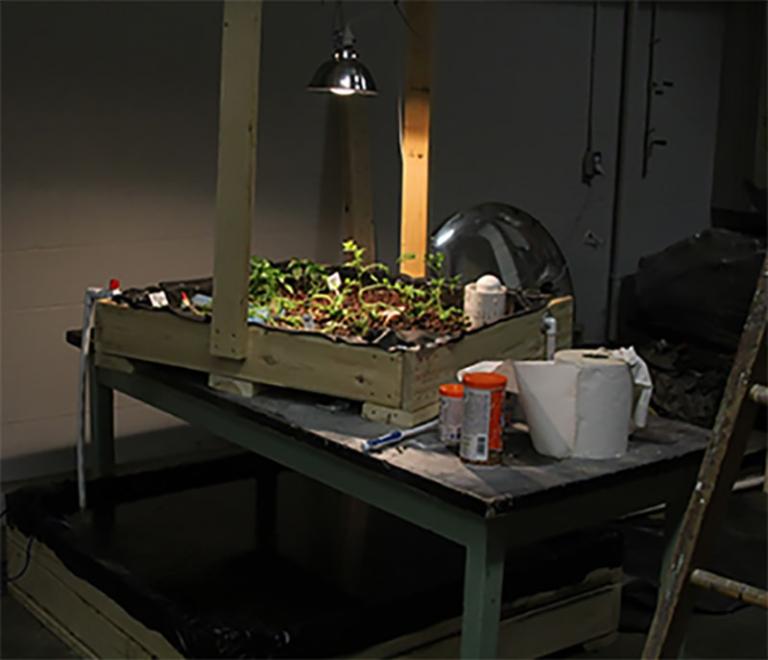
“Students get so much value from projects like this -- they are impacting the community in a positive way and also using a wide range of skills from several engineering disciplines.”
A group of Kettering University students are currently working on a capstone project that features significant community collaborations and the end result will both make use of currently vacant space in the city as well as provide a food source for residents.
The students, as part of Kettering’s Center for Culminating Undergraduate Experiences Interdisciplinary Senior Capstone Design course are working with Metro Community Development of Flint and PetraFirma, LLC, to design an aquaponics system. The work done in the Interdisciplinary Capstone course constitutes the legwork needed for the much larger scope of a Professional Practice Thesis.
The initial system will be built in an empty garage area in the Metro Community Development building, with construction planned to start later this summer. Kettering students will design and oversee construction of the system, with labor provided by students in Metro Community Development’s Youthbuild program.
Once the concept is proven in the smaller setting, the plan is for a larger scale aquaponics farm to be constructed in the building that formerly housed the Flint Farmer’s Market. The Farmer’s Market is in the process of moving downtown Flint, scheduled to open later this month.
The Oak Business Center in Flint, where students will help build a large scale aquaponics facility in a currently unused warehouse
“This project is an example of the many engineering projects that have a real-world impact taking place in the CCUE interdisciplinary course,” said Dr. Matthew Sanders, Kettering University professor of Industrial Engineering and CCUE Director. “Students get so much value from projects like this -- they are impacting the community in a positive way and also using a wide range of skills from several engineering disciplines.”
Students working on the project are divided into three groups. The construction group is David McChesney, Marc Taipala, Jorey Scrivense and Xixi Bi. The monitoring group is Spencer Scott and Nan Ding. The ecology group is Jeanette Smith, Nicholas Potter and Caleb Harrison.
Staff of Metro Community Development became interested in the aquaponics concept and sought Kettering’s input based on work that Sanders and other students have done in Flint capstone projects, including with Harvesting Earth Farm in the Beecher area.
Students did an initial study of aquaponics systems, including site visits to Milwaukee’s Growing Power Inc. and Chicago’s The Plant. They then designed a concept that could be built in the warehouse space at Metro Community Development, then eventually scaled up and replicated at the former Farmer’s Market building. They will also work with the Youthbuild students on construction and also train them to test, monitor and harvest crops from the facility.
The project will include designing system components like tanks, beds, pipes and computer monitoring equipment for remote operation.
“This project is combining hydroponics with traditional farming and with aquaponics,” said Smith, a Chemistry major. “We are making an enclosed system that eliminates waste. The need is there for a more compact system. We can grow a lot of food in a small space. The Youthbuild students will learn how to maintain the system and harvest plants and also learn real-world job skills. Produce will go back to people of Flint through the Farmer’s Market -- Flint needs more access to good produce at a reasonable cost.”
Dr. Matthew Sanders (left) talks with Ravi Yalamanchi and Dan Fleckenstein of Metro Community Development
Along with the benefit of giving Youthbuild students the opportunity to work on a unique engineering project, the food produced by the facility will have a great impact on the community. The aquaponics farm will raise and harvest produce and fish that is pesticide-free and herbicide-free and will be self-sustaining.
“Genesee County spends approximately $1.2 billion on food per year, with much of that money being spent on food produced outside of the county,” said Ravi Yalamanchi, CEO of Metro Community Development. “The produce will be produced in Genesee County and sold here, and the facility will create jobs, so it’s a great economic opportunity for the area.”
The partnership has been a valuable one for Kettering and for Metro Community Development. Kettering has been able to give students the opportunity to create a real, replicable and positive development in the community while Metro Community Development has been able to get access to engineering services at a drastically reduced cost while also giving their Youthbuild students to engage in a complex and rewarding project.
“The Kettering students have done an incredible job,” said Dan Fleckenstein, board member for Metro Community Development. “The best way we can revitalize the Flint area is through community partnerships like this.”